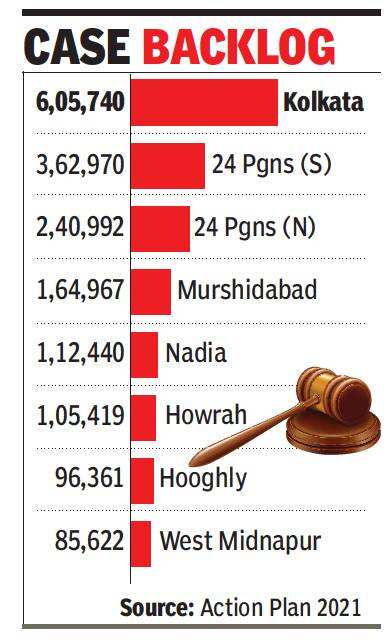Top Searches
- News
- City News
- kolkata News
- West Bengal: All district courts set to fast-track long-pending cases
West Bengal: All district courts set to fast-track long-pending cases

Picture used for representational purpose only
KOLKATA: Courts in all Bengal districts, including Kolkata, will attempt to dispose of all cases filed since 2014 by the end of this year.
According to the National Judicial Data Grid, Bengal has a case pendency of around 25 lakh, which is around 6.3% of the 3.9 crore pending cases across India. Eight districts — Kolkata, North and South 24 Parganas, Howrah, Hooghly, Nadia, Murshidabad and West Midnapore – that have the highest case pendency in the state will take a lead in this effort, says an action plan released by Calcutta high court.
Impacted by the digital divide in a Covid year, courts across Bengal have been unable to function normally. However, case pendencies have not galloped due to the lesser cases filed owing to restricted mobility and lack of access to online modes. The eight districts with the highest case pendency (the highest being in Kolkata with 6 lakh pending cases) will also target to clear cases related to child abuse and crime against women that are two-year old. Moreover, it will try to dispose of corruption cases and drug offences that are three-year old. Also, the judges have been asked to take up cases urgently in which undertrials have spent two years or more in custody. A similar case disposal roster has been set for districts with less case pendencies.

The district courts, after identifying the cases under the action plan, will put them up on their websites, mentioning the stage of hearing. This will be updated by the 10th of every month. Only the chief judge or the district and sessions judge can change or prioritise cases from the list. Addressing the issue of vacancies in some courts due to transfers, leave or resignations, the case backlog in that court must be distributed equally among other judges, the plan proposes. The action plan also proposes a reasonable time-frame for the parties to be heard before the cases are closed. The high court will also have to be updated on the case disposal rates every month.
How a judicial officer disposes the cases will also feature in their annual confidential report. The plan says cases in which interim orders have been passed need to be disposed of within a month and bail applications are to be heard within a week.
According to the National Judicial Data Grid, Bengal has a case pendency of around 25 lakh, which is around 6.3% of the 3.9 crore pending cases across India. Eight districts — Kolkata, North and South 24 Parganas, Howrah, Hooghly, Nadia, Murshidabad and West Midnapore – that have the highest case pendency in the state will take a lead in this effort, says an action plan released by Calcutta high court.
Impacted by the digital divide in a Covid year, courts across Bengal have been unable to function normally. However, case pendencies have not galloped due to the lesser cases filed owing to restricted mobility and lack of access to online modes. The eight districts with the highest case pendency (the highest being in Kolkata with 6 lakh pending cases) will also target to clear cases related to child abuse and crime against women that are two-year old. Moreover, it will try to dispose of corruption cases and drug offences that are three-year old. Also, the judges have been asked to take up cases urgently in which undertrials have spent two years or more in custody. A similar case disposal roster has been set for districts with less case pendencies.

The district courts, after identifying the cases under the action plan, will put them up on their websites, mentioning the stage of hearing. This will be updated by the 10th of every month. Only the chief judge or the district and sessions judge can change or prioritise cases from the list. Addressing the issue of vacancies in some courts due to transfers, leave or resignations, the case backlog in that court must be distributed equally among other judges, the plan proposes. The action plan also proposes a reasonable time-frame for the parties to be heard before the cases are closed. The high court will also have to be updated on the case disposal rates every month.
How a judicial officer disposes the cases will also feature in their annual confidential report. The plan says cases in which interim orders have been passed need to be disposed of within a month and bail applications are to be heard within a week.
FacebookTwitterLinkedinEMail
Start a Conversation
end of article

